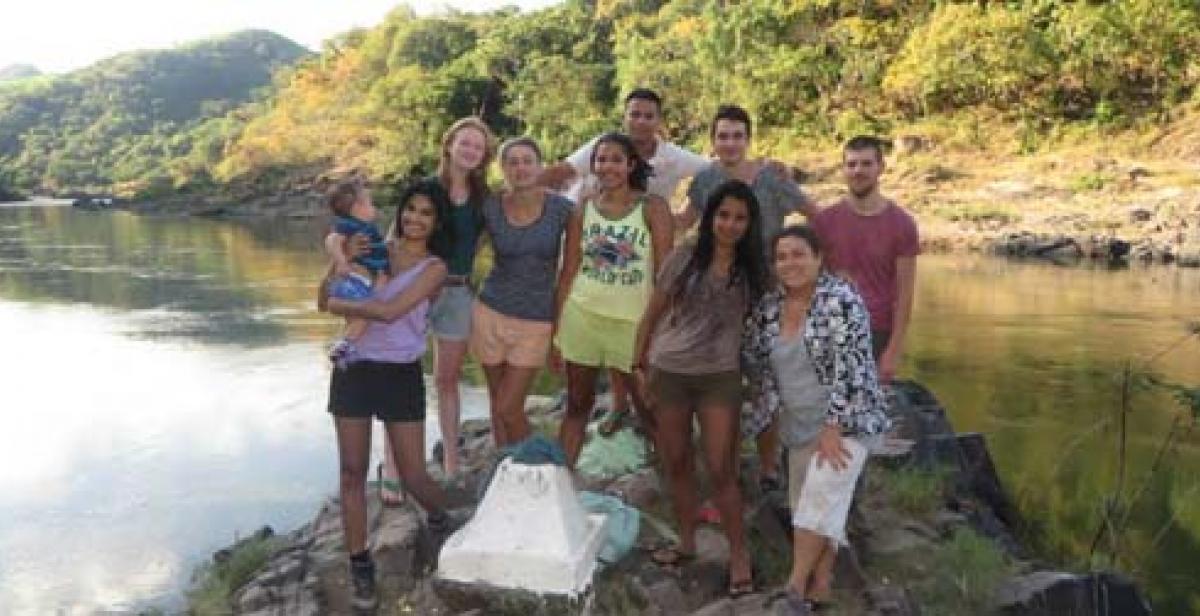Over the past four weeks, my compañeros and I have had the absolute honour of experiencing first hand the remarkable Salvadorian ability to overcome the arduous situations that, from time to time, life tends to coldly throw our way.
Strength - I cannot lend enough truth to this word to describe these incredible people. Both physically and mentally, they encompass the true meaning. I know I do not speak only for myself when I say how I look on with amazement, and beaming admiration when I see my work mates hauling great weights - torn with such skill from the earth they value so - onto their backs as if they were lighter than the early Santa Martian morning that creeps gently in over the hills to greet us.
“Todos en la cama, o todos en el suelo” (everyone in the bed, or everyone on the floor).
But lamentably, the bleak fate of the war is not the most recent hurdle El Salvador has had to sprint towards with hope clutched firmly in its palm. The mining companies too, are threatening not only the life of this beautiful country’s landscape; but also its people.
El Salvador pulses with life; boasting 300 habitants per kilometre of land squared. Or rather, 100 times that of Canada, the home of the gold mining company, who is attempting to contribute to the devastating environmental impacts upon one of the world’s richest countries in biodiversity. It has been calculated that, according to the proposals of these companies, the amount of water they intend to use in one hour to facilitate the extraction of the gold, would be sufficient water for a family for 20 years. The size of a grain of rice of the chemicals used is enough to kill a person, and yet the companies claim they will use over a tonne daily. Not only this, but the harsh chemicals used by these companies – cyanide being the main culprit – contaminate the river water that, for El Salvador and its people, is the source of life.
“They come, to impoverish our land.”
The impacts grow crueller still when it is remembered that in the areas where the mines would exist – and have existed – are areas where fishing is thrived off as a livelihood, and indeed survival. As it stands, 98% of the water in El Salvador is already contaminated, partly due to companies such as these. Therefore the very air in my lungs shivers at the thought of the consequences of more mining in this vulnerable country.
“We are talking about a question of life, or death.”
Of course, these despicable companies come armed not only with fatal weapons and an extortionate amount of money, but also empty promises, which have been proven capable of tearing families and whole communities in two. The work that is described to the people of Cabañas, and surrounding areas of El Salvador, is sadly not the harsh reality of the gruelling physical work that they are met with, as the companies hire in the technical engineers from afar. Of the 16,000 habitants in the municipal of Las Cabañas, only 608 jobs have been provided by mining companies over eight years. The torment lies deeper: compared to the 35 dollars per hour a miner in Canada is paid, a local Salvadorian, in his own land, is paid a mere six dollars a day.
“The mining industry has never been a source of income for El Salvador”
I am saddened to say, that this devastation is shared with neighbouring countries Honduras and Guatemala, making the impacts reach from a local, national to an international scale. ADES – the partner organisation working with Progressio here in Santa Marta – is campaigning against these damaging companies in a number of ways, including collecting signatures for petitions to be sent to the Salvadorian government. The other ICS volunteers and I wanted to know what we could do to help prevent these detrimental companies bring catastrophe to this, and many other communities in El Salvador. As well as signing the petitions, I have made it a personal goal of mine to bring awareness and share the brave stories of these people to other corners of the world, so we can all stand together to make a difference, and save the future of El Salvador.
Written by ICS volunteer Daisy Vaughan



